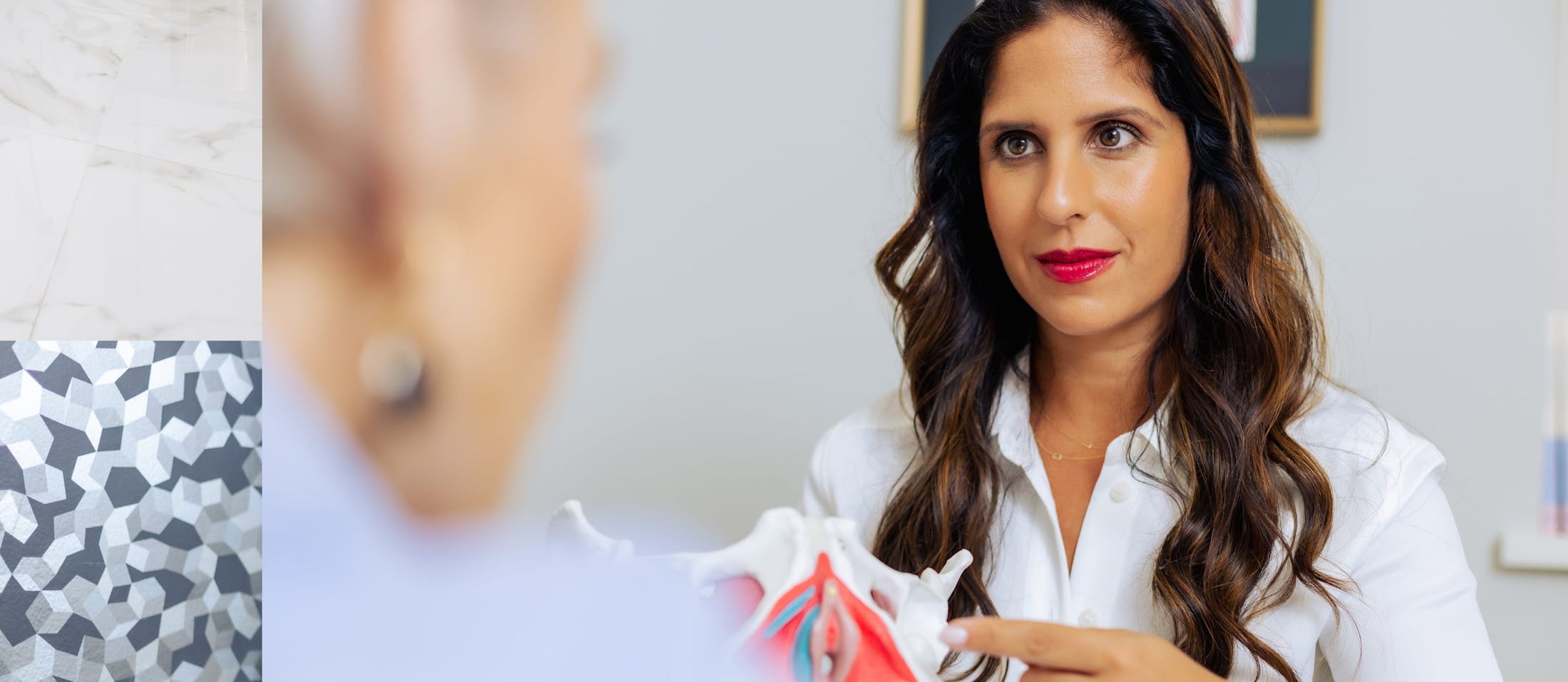
So you’ve been suffering from pelvic pain and you’ve finally decided to find yourself the care you deserve. The Pelvic Pain Doc team is here for it (insert clapping hands emoji here)! We love to see people take control of their pain and get themselves on the road to recovery. But knowing you need help is one thing — figuring out where to go and who to see is another. Should you see an OB/GYN for pelvic pain or do you need a pelvic pain specialist? What’s the difference between a urologist and a gynecologist? What does a pelvic pain specialist do anyway?
If you’ve ever wondered who to see for pelvic pain, or you’re curious about what exactly Dr. Sonia Bahlani does here at Pelvic Pain Doc, you’ve come to the right place. In this post, we’ll answer your questions about pelvic doctors, including:
What is pelvic pain?What does an OB/GYN do?What does a pelvic pain specialist do?Which type of pelvic pain doctor do I need?What conditions can a pelvic pain specialist treat?
What is Pelvic Pain?
Pelvic pain is pain that occurs in the area below the belly button and between your hips. It can result from issues within the reproductive, digestive and urinary systems, and may include any of the internal organs within the pelvic region. Pelvic pain can affect all genders, though it most commonly affects people born with female reproductive organs.
Pelvic pain is not a one-size-fits-all condition. There are many causes, symptoms and nuances involved in the experience, diagnosis and treatment of pelvic pain. It can be acute in nature, which means it lasts for less than three months, or chronic, which means it lasts for more than six months. Common pelvic pain conditions include:
AppendicitisBladder disorders (such as urinary tract infections or interstitial cystitis)Sexually transmitted infectionsKidney infection or kidney stonesIntestinal/digestive disorders (such as inflammatory bowel disease)Nerve conditionsHerniaPelvis disorders (such as hypertonic pelvic floor dysfunction)Psychogenic pain (pain as a stress response to past psychological or physical trauma)VulvodyniaEndometriosisPelvic inflammatory diseaseUterine fibroids
What is an OB/GYN?
When people experience pelvic pain, they often assume they need to see an obstetrician or gynecologist. Obstetrics is the field of study that focuses on pregnancy, childbirth and postpartum care of birthing parents. Gynecology is concerned with the functions and diseases of the reproductive systems for people designated female at birth. Since the medical specialties of obstetrics and gynecology are so closely related, they are often practiced together, hence the hybrid title “OB/GYN.” There’s a common misconception that OB/GYNs are the go-to type of doctor for pelvic pain. However, their expertise is primarily focused on the reproductive system, rather than pelvic pain or pelvic conditions as a whole.
Dr. Bahlani’s journey to becoming a pelvic pain doctor first began in obstetrics and gynecology. After graduating magna cum laude with an undergraduate degree and then receiving her Doctor of Medicine degree, she completed her residency in OB/GYN at New York Presbyterian/Weill Cornell Medical Center. This gave her foundational knowledge of reproductive health and conditions affecting the pelvic region. But she kept seeing people suffering from pelvic pain in silence or spending years searching for answers without finding relief. So she listened to her gut, veered from the traditional OB/GYN path and pursued a career as a pelvic pain specialist.
What is a Pelvic Pain Specialist?
A pelvic pain specialist is exactly what it sounds like: a doctor who specializes in the treatment of pelvic pain. Think of it this way: an orthodontist is a dentist with expert training in aligning the teeth and jaw; all orthodontists are dentists first but not all dentists become orthodontists. So, all pelvic pain specialists are doctors (and often OB/GYNs) first, but they then go on to specialize in pelvic pain, especially chronic pelvic health conditions.
After Dr. Bahlani completed her OB/GYN residency, she pivoted and studied urology, working with pioneers in the world of pelvic pain. This specialized training gave her the holistic expertise to treat patients with urologic and gynecologic pelvic pain syndromes, such as vulvodynia, pelvic floor dysfunction, interstitial cystitis, vulvar dermatoses, sexual dysfunction and so much more.
But what does a day in the life of a pelvic pain specialist look like? As a clinician, as well as through her continual pursuit of knowledge and research, Dr. Bahlani strives to empower her patients to spend less time in pain and gain the tools they need to live their lives to the fullest. She takes a holistic view of common pelvic health issues, focusing on the medical and procedural treatment of pelvic pain. Through a compassionate, patient-centric approach, she listens to her patients to gain a deep understanding of their challenges. This allows her to develop a comprehensive, personalized treatment plan aimed at addressing the issue from all angles to improve patients’ quality of life beyond what they thought possible.
What Type of Pelvic Pain Doctor Should I See?
As we’ve discussed, people who treat pelvic pain conditions differ slightly depending on their area of focus. Gynecologists focus on treating acute conditions that affect the female reproductive system, whereas an obstetrician is the right person to see for pain related to pregnancy, childbirth and postpartum. If you’re experiencing chronic pelvic pain, you should see a pelvic pain specialist to get a proper diagnosis and personalized treatment plan.
To determine which type of pelvic pain doctor you need, ask yourself the following questions:
How long has my pelvic pain been going on? If you’ve been experiencing pain for less than three months, start by speaking with your general practitioner or visiting a gynecologist. If it has persisted for six months or longer, it may be time to visit a pelvic pain specialist in New York.Is my pain related to pregnancy, childbirth or postpartum? If so, speak to your obstetrician or maternity specialist.
 What Conditions Does a Pelvic Pain Specialist Treat?
What Conditions Does a Pelvic Pain Specialist Treat?
A pelvic pain specialist has the expertise and qualifications to treat pelvic disorders of all kinds, from acute pain conditions and sexually transmitted infections to chronic pain with no clear identifiable cause and psychogenic pelvic pain. Through a combination of therapies — including medications, physical therapy and psychotherapy if/when appropriate — a pelvic pain specialist like Dr. Bahlani can help you overcome your pain so you can get back to living your life. Here are some of the conditions we treat here at Pelvic Pain Doc:
Vulvodynia: Also known as vestibulodynia, vulvodynia is chronic pain around the opening of the vagina that has no identifiable cause. Symptoms may include burning, swelling, pain during sex and more.Endometriosis: Endometriosis occurs when uterine cells grow outside of the uterus on other organs, such as the ovaries or bladder. Symptoms may include extremely painful periods, pain during or after sex, infertility and more.Interstitial cystitis: This condition refers to an inflamed bladder with symptoms similar to a urinary tract infection, but with no infection present. Symptoms may include pressure and pain in the abdomen, prolonged urinary tract symptoms, and pain during sex.Pelvic inflammatory disease: Typically caused by an untreated sexually transmitted infection, pelvic inflammatory disease is an infection of the uterus, fallopian tubes or ovaries. Symptoms may include irregular periods, pain during urination, fatigue, or pelvic tenderness.Uterine fibroids: These non-cancerous tumors can grow in and on the uterus, causing abdominal pain, pressure, constipation and heavy periods. Many people with uterine fibroids won’t notice any symptoms at all.Psychological causes: Physical pain isn’t always caused by a physical source. Many people, particularly those who have suffered sexual assault or abuse, experience pelvic pain in response to emotional distress. Symptoms may include depression, anxiety, stress, and more.Vulvar itching: This condition refers to itching of the vulvar area. It can be caused by skin irritations, infections, hormonal changes or stress.Clitoral pain: Clitoral pain refers to sharp or stabbing pain in the clitoris, or rawness/irritation, that can be exacerbated by touch, walking, wearing tight underwear or moving at certain angles.Hypoactive sexual desire disorder: This refers to a lack of desire for sexual intimacy in any form — from desire and arousal to orgasm and resolution. This condition can affect all genders.Persistent genital arousal disorder: This condition refers to unrelenting, unwanted, persistent, intrusive and spontaneous sensations of arousal in the clitoris, vulva, perineum and/or anus, in the absence of conscious thoughts of sexual desire or interest.Pudendal neuralgia: Pudendal neuralgia refers to chronic pelvic pain involving the sensory distribution of the pudendal nerve. This can be a painful and disabling neuropathic condition.Chronic yeast infection/bacterial vaginosis: Candidiasis (yeast infection) and bacterial vaginosis are two types of vaginal infections. When these infections, or certain STIs, recur even after treatment, they become chronic and may require treatment by a pelvic pain specialist.Hypertonic pelvic floor muscle dysfunction: Hypertonic pelvic floor muscle dysfunction refers to a condition caused by tightness in the pelvic floor muscles, or the “levator ani complex.” This area of taut muscle bands can spasm, which decreases blood flow and oxygenation, increases lactic acid, and causes pelvic pain.
If you think it’s time to see a pelvic pain specialist, you’re probably right. Contact Pelvic Pain Doc to learn more about how a pelvic pain doctor in New York can help get you on the road to recovery.

